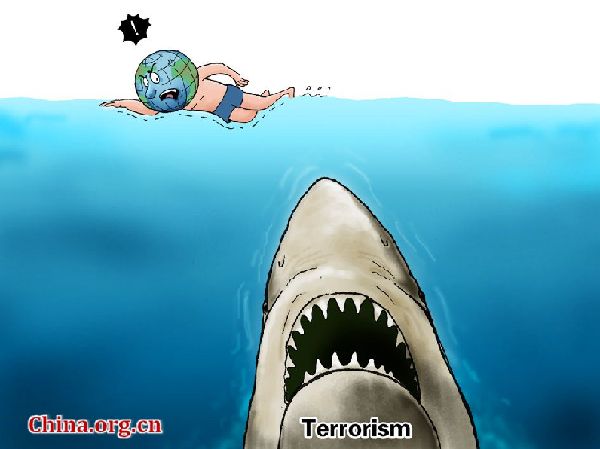Geopolitical threats of 2016
- By Sumantra Maitra
 0 Comment(s)
0 Comment(s) Print
Print E-mail China.org.cn, December 27, 2015
E-mail China.org.cn, December 27, 2015
|
|
|
Hidden threat [By Zhai Haijun/China.org.cn] |
Continuing with my previous column on what were the biggest geopolitical changes of 2015, we now look to the new year. This is the part a political scientist hates. Economists love to predict, because their predictions will be essentially categorized in a binary of good or bad. Yes, there can be a status quo, but, in economic terms, that might either be a relative context to previous growth or stagnation, and will thereby be classified as positive or negative. This doesn't work in international relations, where variables are multiple, and predictions trickier.
ISIS will continue to be a major headache for world powers, unless a peace deal is signed, Assad leaves power, giving way to a ground campaign by NATO-Russia joint forces. Now, the last idea is highly unlikely. One needs to understand some basic facts. In the past two years, ISIS has killed a combined total of 6,000 people maximum, including Yazidis and Kurds.
However, Syrian President Assad's supporters have killed 250,000, mostly by bombardment. It is common sense that, whatever direction the war takes, it will never reach a negotiated settlement as long as Assad remains in power. It won't be easy for Russia to persuade Assad to abdicate.
And with that, ISIS will also hold the firm mantle of opposition to Western/Russian crusader states, as well as the secular dictators of Middle East, and will continue to attract the disgruntled psychologically lost boys for the ultra-violent cause of Jihad.
It is obviously not a simple binary Muslim versus non-Muslim civilizational clash, as a lot of people on both sides of the spectrum try to portray. It is essentially an insurrection of an entire generation of people, who are disgruntled, ideologically stunted, without any good role models or economic future, and with a strong sense of moral victimhood.
The second biggest threat will be the loss of State control in areas of the globe, leading to state conflicts in other parts. An entire region from Southern Turkey to Eastern Afghanistan, has no effective State control. There is no fundamental authority and institution, and the borders and demarcations and systems in place since the end of the Second World War, have crumbled.
There are various reasons, including corruption, lack of democratic institutions, the geographical curse, geo-economic stagnation, cultural conservatism, etc., and one can keep arguing about them. However, the end result is diminishing order and eventual total anarchy. That anarchy cannot be contained, as it has means to spread to other parts, whether as a security threat and terrorism, or economic threat as refugees, or social threat as an ultra-right wing backlash against refugees.







Go to Forum >>0 Comment(s)